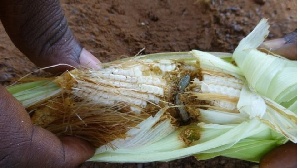 The Fall Armyworms have destroyed acres of farms in Ghana and other sub-Saharan Africa countries
The Fall Armyworms have destroyed acres of farms in Ghana and other sub-Saharan Africa countries
The fall army worm infestation was first detected in Africa in 2016, particularly in Nigeria, and since then it has spread rapidly across sub-Saharan Africa, with 28 African countries having confirmed its presence currently, affecting some 300,000 hectares.
It presents an emerging wave of a problem for crop growth on the continent, particularly for maize which is a staple in many African countries.
On September 7, during the 2017 African Green Revolution Forum (AGRF) held in Abidjan, there was a session tilted “fall armyworm Infestation: Status Update and Lessons Learnt from Across Africa” to provide an update on the current scale and impact of the invasion and the outlook for the agricultural season ahead.
It also sought to discuss mitigation strategies, as well as, share success stories. It was organised by AGRA and the Centre for Agriculture and Biosciences International (CABI), with Dr. Roger Day, Sanitary and Phytosanitary (SPS) coordinator, CABI at hand to lead the presentation.
Dr. Day explained that the fall army worm is endemic to the United States and Latin America but is new to Africa and was first detected, as earlier mentioned, in 2016.
B&FT had an opportunity to interview Dr. Day one-on-one and he indicated that the mere identification of the caterpillar doesn’t not spell doom because even though eating of the leaves will occur, it can be overcome if it is not done on a large scale since the leaves can easily regenerate.
He likened the situation to a person catching a cold, it can treated and health is restored. Therefore the caterpillar eating maize leaves is not necessarily bad. However, if the eating becomes too much, there’s cause to worry since the plant then becomes weak and makes it difficult for it to recover.
Dr. Day therefore challenged researchers to find out how much damage can be sustained before one needs to do something. “A 100,000 hectares of field attacked by the caterpillar does not mean a 100,000 hectares of maize destroyed, and I think that is the mistake people often make”, he added.
He however cautioned that managing the invasion in one season does not mean it has been conquered because it can resurface in subsequent seasons, and from the look of things, the fall armyworm is here to stay. Therefore, what is important is for researchers and scientists to devise long-term ways tol control it, Day stated.
Dr. Day also cautioned on the over-reliance on pesticides to control the pest since it makes it easy for the pests to develop resistance to treatment which then presents a widespread problem. He recommends the option of bio-pesticides because of the lower risk option.
He however noted that if the average smallholder farmer finds it difficult to purchase pesticides, the likelihood to be unable to purchase bio-pesticides becomes even greater and therefore advised that the farmer can go around the field and crush the caterpillar and eggs with the bare hands.
He said CABI was instrumental with the Ministry of Food and Agriculture (MOFA) in preparing Ghana’s response plan to control the outbreak. He observed that the caterpillar feeds on more than 80 crops, though it prefers maize, and can cut yields by 60 percent.
- Pokrom Nsabaa: Farms destroyed with chemical over land dispute
- Researchers work to find biological control solution to fall armyworm
- Researchers work to find biological control solution to fall armyworm
- Don’t wait to see fall armyworm before you spray – Agric Director
- MoFA moves to contain Fall Army Worm outbreak
- Read all related articles










